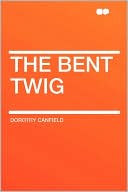

 |

|

The average rating for The Bent Twig based on 2 reviews is 3 stars.
Review # 1 was written on 2008-08-19 00:00:00 Ian Lennon Ian LennonA peculiar reading experience, as the intellectual ideas Canfield explores here are quite dated. Canfield was interested in Montessori and socialism. The entire book is focused on the heroine's struggles in choosing between a life of amoral beauty or simplicity and comradeship. Guess which she chooses? It's actually a good read. Canfield's characters are interesting and complex enough to shine through the didactic tone. |
Review # 2 was written on 2015-07-02 00:00:00 David Romanoff David Romanoff"An American Edwardian Soap Opera in Slow Motion"" What comes to mind when you hear the term, the "bent twig?" Does it suggest a small branch whose normal direction has been accidentally thwarted or deliberately redirected in its growth? Now add the concept that this "twig" is actually a young, impressionable girl growing up in Edwardian America. Will she survive the attempts to experiment with her character formation--to ultimately mature into her true self, or undergo cruelly meddlesome social and emotional modeling--as per to someone else's plan for her life? Canfield's 1915 literary soap opera of social and personal reformation introduces readers to a little girl named Sylvia, who grows into young adulthood first in the Midwest (in the French-named city of La Chance), then in the "finishing school" of her beloved Aunt Victoria in Lydford, VT. Canfield includes many serious themes in her romanticized novel: * Racism'that "disintegrating moral force in the national character" * The subtle war for a woman's purse by a luxury department store * The stigma of Spinterism'that a young lady who is not married by the ripe age of 20 is doomed for governessing or outright social work. * Financial morality: that one should not rest easy on luxuries earned by the toil and hardship of poorer classes. * Social obligations to care properly for sick family members of all ages * the danger (or comfort) from trust in Planchette's Ouija board messages At risk of being corrupted into a snob or at least a lady who marries for money and social position instead of for love, Sylvia Marshall undergoes many disappointments as her heart flutters for one beau then another. Often she is faced with choices of suitors who are older than she--in Vermont and also in Paris. Her sister, Judith, and her cousin, Molly, also are courted; dramatic emotional scenes result when one young lady switches beaus. Self-sacrificing Sylvia denies her heart on several occasions and demonstrates amazing filial respect for the upbringing of her modest parents. Sylisticly there are too many passages of moralizing--sermonettes on aesthetics, which do little to advance the languishing plot. Then after long pages of aesthetic "conversation," sudden melodramatic events break the literary stagnation. Abrupt changes of locale may offer readers confusion, as the lovers maddeningly defer expressing their true passions. Authors enjoy showing off their familiarity with European watering holes. Expect both direct and indirect literary references to turn-of-the-century works. THE BENT TWIG proves a romance cum social reform, at a molasses pace. July 19, 2015 |
CAN'T FIND WHAT YOU'RE LOOKING FOR? CLICK HERE!!!